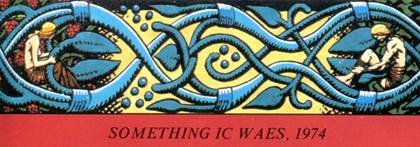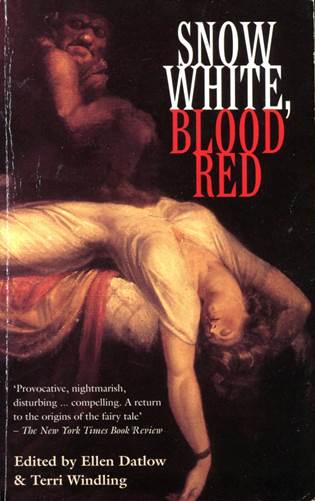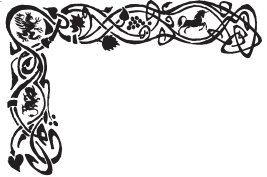
Hunter and Prey Entwined

(BWS, detail)
And then it happens again. The scent of sweet damp fills the house, and an owl calls so close I turn to make sure it’s not in the room with us. I can hear the sound of a stream running, of light, rapid footfalls on the forest floor. Once again, a presence belonging to the mountains has slipped over the walls and through the screens. Something of the wild comes in, glides across the floors, sinks into the quilts, and makes itself at ease like a guest among us. (The Fox Wife, Ellen Steiber, Ruby Slippers, Golden Tears page 307)
The Fox lives within the wife, urging her to take what is hers from all she sees and scents
She holds the fish in one hand, unmoved by its frantic struggles. Its scales shine like new metal in firelight.. she puts the head of the fish into her mouth and bites straight through the wriggling red-gold body. (page 317)
Man and woman must eat, so man and woman must hunt. A primitive truth that fairy tales awaken in our unconscious thought. They take you as far away from hypothetical pseudo-realities as it is possible to go.
BWS’s Something Ic Waes, the hunter and prey, takes us into that primal dimension of otherness, where nothing is the same

and the sacrificial rites speak to power (see Adastra in Africa Tales of Faith 4), the deities of the groves live again
Rather the shrine was built on this site because here the mountain spirits are alive. They are in the foxes that line the stairs, in the water that pools beneath the moon, in the boulders among the trees, in the trees themselves. There is nothing here that does not breathe with life, including the two great white foxes who belong to Inari. (page 342)
This world is similar to the higher truths of classical tragedy. In Euripides’s Iphigenia in Aulis, Iphigenia is about to be sacrificed to Artemis – to save the Greek fleet – when the goddess intervenes and places a stag in her stead. Animal blood flows in place of human. A bloody stag on a stone slab; awakening of the primal unconscious; the annual Dionysia of plays in antique Athens.. The word speaks for itself (Nietzsche’s thesis of the primitive origins of tragedy in the lusty nature god, The Birth of Tragedy)
Now, a play is the staging of action, not action per se – and it occurred to me whereas plays are intellectual entertainment, the goddess of the hunt – Artemis – is dark mystique. The Greek playwrights such as Euripides wrote 1,000 years after the events of the Trojan war. In the film Iphigenia, Cacoyannis makes very sure to portray the Greeks as quite primitive in their regal splendour.
“Fate rules, not I”, says Agamemnon. Howard didn't really rate philosophers (of Greek drama), and mentions Byron – for his boxing prowess – but not Nietzsche. Byron was also adventurous and daring almost to folly, and perished at Missolonghi defending the Greeks against the Turks.
The idea of dark mystique is quintessentially Howard, and there is something there that is not of the intellect, a “thingness” (Tales of Faith 10). It seems to me Nietzsche does have this as he was a poet (Thus Sprach Zarathustra) but he certainly made an intellectual point of opposing Dionysus to Apollo in The Birth of Tragedy.
Howard, in his adventure fantasy, obviously has no such intellectual barrier to the dark forces of mystique, in fact they almost are his hallmark! What you could say is any “rule” or system, such as Dionysus and Apollo, is never the whole truth as there is always a mysterious element in our sleeping unconscious. The blood that pulsates in our brains; the fairy tale crones; the macabre, the other, the changeling.
This is the female element, the sleeping unconscious that is at the root of Weird Tales and the Snow White, Blood Red series of modern fairy tales. Nemesis awaits those who cast the sleeping unconscious aside, whose hubris builds a spurious world of separate, delusive realities. Enter Elon Musk, whose latest project is a high-speed electric-tunnel of “pods” "
For tunnels you can have hundreds of lanes, there’s no real limit," he said. The tunnel system could also continue deeper and deeper with more demand.
This is a perfect example of a parallel reality that separates us from Mother earth, locking is into psychotic ego-lust, with a chorus of CERberus on tannoy (the house-band of CERN, see prev.) I think it has to do with the spuriousness of facts that they concoct for our benefit, where we are all individual and at the same time easy prey for social-media, beamed to “capsules of comfort”. What is never there is the communal or ensemble nature of living which is tiered and different, as opposed to always level and the same
The chorus of the media has been in full cry with our wedding of royalty to US entertainment. The gist of it seesms to be the Windsors are “adapting” and hence surviving. This is at best a half-truth. “They” always want us to adapt so that everything becomes the same. I’ve nothing against a royal wedding for good cheer but, as Oxbridge academic Robert Tombs says, not since Queen Anne (after James II) has a monarch overruled parliament. As he also says, the Anglo-Saxon kings were partly elected, which begs the question, why is parliament so domineering?
What “they” don’t want us to realize is that tiered differences have a spiritual profundity that level sameness doesn’t. The singing cowboy communes despite the lonesome prairie. The media is approaching a vanishing point of nothingness, filled with spurious facts on individuals who have a cy-side, the social-media and its associated confort-zone. Facts become fiction and nothing is truly organic. The superficiality of this was brought-home to me by a bawdy piece of Elizabethan fairy tale called The Printer’s Daughter by Delia Sherman.
..the child stood upright on paper-twist limbs and beagn to distribute the scattered type into the cases, her arms spinning like flywheels. The clout dropped from her shoulders and she stood naked on the floor. (Ruby Slippers, Golden Tears page 388)
A pamphleteer constructs a fetish-doll of scraps which, by devious means turns into an urchin reciting the stuff of which she is created, bawdy verse and scripture. It makes a point about these two sides of life, neither of which are factual and so nothing to do with the press of today. It is literally an organic press of desires and beliefs, body and mind. Lusty and musty, the very opposite of spurious facts that become convenient fictions for the cy-side.
“’Twas less magic than desire birthed thee,” Blanke said to her, “than printer’s desire for company; the alchemist’s desire for his grimoire. So logic would argue ‘tis desire must send thee back to thy papery womb.” (page 405)
Fairy tales can be filthy and scambling because they have an honest spirit, just as Melissa Scott’s language in The Armor of Light indulges in mild blasphemy (“God’s ass”, “Christ’s balls.) Body and mind and not facts. That is the Elizabethan cosmos of pornography and religiosity which speaks to human desires and beliefs. The same could be said of Greek society, with the transformative deities of lusty desire chasing anything that wears a skirt (Weird 5).
Alan Moore and Melinda Gebbie’s Lost Girls is a sort of protest against the marketing of pornography into a vanishing –point of athletic nothingness. Ian McEwan makes a similar point in On Cecil Beach. The body per se is sexual and in Greek times athletes went naked. CC Beck says the sign of a declining civilization is “They sell containers with nothing in them” (TCJ 90)
Yes, because we eat and drink and consume without the spiritual pornography of the human body/mind. We become automatons. If you look at Renaissance religious art, it is largely pornographic. Neither of those two sides of reality do we get; there is a vanishing-point of cyber-athletics which tells you nothing about body or mind.
One also thinks of Dr Wertham’s Secuction of the Innocent in the 50s. In Alter Ego #95, Michael T Gilbert quotes the good doc on TV, adding his wry comment
P381: Television is a miracle of science. Comic books , on the contrary, are a debasement of the old institution of printing, the corruption of the art of drawing, and almost an abolition of literary writing. Television is a signpost to the future. Crime comics are an antisocial medium that belongs to the past.
MTG: Yes, you’ll never find any crime and murder on The Miracle that is TV!
Wertham is a po-faced puritanical almost proto-cyborg who thinks lust is something restricted to over-18 shelves and has nothing to do with the content of our minds.
The inward/outward, Yin/Yang of fantasy is something that escapes those who seek to level our reality to infinite parallel lines of nothingness; an insane maze where fact becomes fiction, and the sleeping subconscious is subdued by depraved ego-lust of dragonspawn, Earthy lustiness denied by aliens in our midst; ciphers of soulless automatons who cravenly slouch to their tune.
The tune of rule or system, calculation and logic. The tune that denies the macabre and gotesque improprieties of past epochs. I mean, you could say logic is better and say hello to your AI friends of the future! No, we are our history or we are nothing. If heads must roll, so be it.
There's a parallel with music, since rule and system are there to be broken. Frank Zappa says the atonal 12-tone system is just as rule-based as the traditional one. This goes back to Bruce Lee (CH12) who said expression was totally separate to rule and technique. In Mozart's day orchestras would play “a la Turk” as an improvised expression on the score, the style. The fundamental point is rules are there to be broken, they're not there to be obeyed because then you become a machine. Orchestras in Mozart's day were freer to extemporized as they saw fit. No one cared, least of all the prince.
We, the moderns, have become rule-obsessed and that is what “they” want. To be one with the machine. Listening to Rick Wakeman's The Six Wives of Henry VIII there is quite a mix of simple melody, lush choir, melodic arpeggios, traditional organ and ragtime. It's neither strictly rule-based (like modern classical) nor non-rule-based (like “New Classical”). Loose expression is the key.
As Zappa says: “If it SOUNDS good to you, it's bitchen; and if it SOUNDS bad to you, it's ******” That is the only criteria that restores our sleeping unconscious because we – human beings – are not rule-based automata. We are symmetrical and have the “logic of the illogical”, the dream of the universe and bloody mystique, so telling and emotionally true.
ANNE BOLEYN
To quote Nietzsche, “Without music life would be a mistake.” Music is something that is not logical but is true. In Greek myth, women are often associated with fertility. Persephone joins Pluto in the underworld for six months, then rejoins her mother Demeter (harvest) as the flowering of spring.
So, the soul of spring is married to death. This is mirrored in the film Iphigenia, where she is due to be married to Achiles. Instead, she is sacrificed to Artemis, and wears her wedding veil to the altar. These are primitive blood-rites, sad and grotesque and the very soul of tragedy. We live and die in a cyclical reality, as music is a cyclical artform. We have to break the rules, see through barriers. “People smiled and had been looser”, sings Grace Slick in “Son of Jesus”, able to live as a true expression of God’s gift; able to break the shackles of Rome.
The grotesque, the macabre, the savage blood-rites – these are all the stuff of Weird Tales and Howard’s atavism. They spring from the primitive lifecycle of nature which Man, in his folly, seeks to adapt to a rule-based system. The super-genome, super-AI and super-harvest future “they” are planning. Listen to the music. Alice breaks all the rules – she is Persephone. Can you see the link with Howard’s heroes and heroines? I hope so.

Click image
Home







